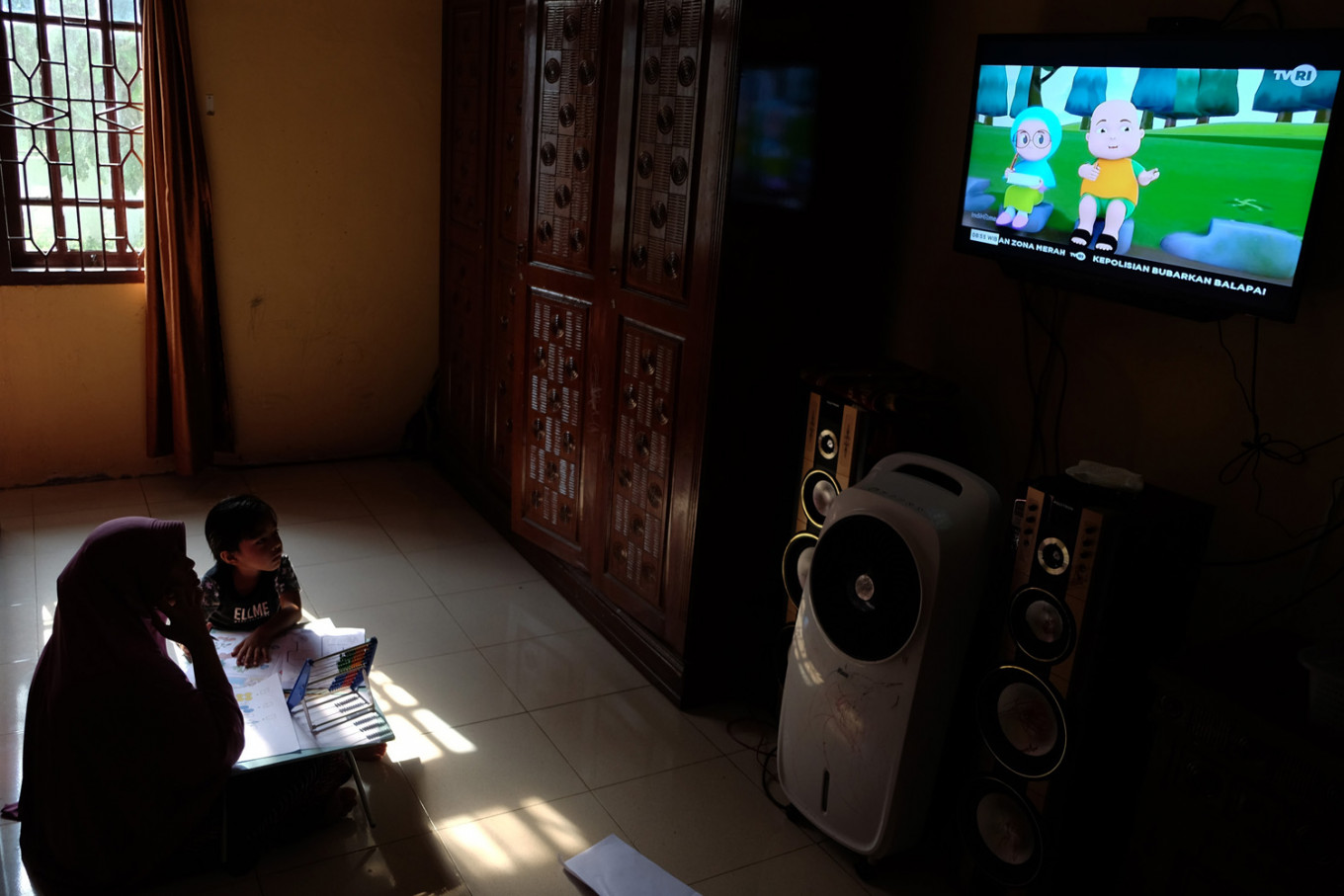Popular Reads
Top Results
Can't find what you're looking for?
View all search resultsPopular Reads
Top Results
Can't find what you're looking for?
View all search resultsIndonesian children vulnerable to secondary risks from COVID-19 crisis: Survey
A recent assessment by Save the Children Indonesia has found that children are exposed to the secondary risks from the COVID-19 pandemic that pose a threat to their health, well-being and lives -- if not more.
Change text size
Gift Premium Articles
to Anyone
The COVID-19 pandemic might have largely affected the elderly and chronically ill adults, but a recent assessment has found that children in Indonesia are exposed to the secondary risks from the health crisis that pose a threat to their health, well-being and lives -- if not more.
Save the Children Indonesia carried out an online survey between April 10 and 27, involving 11,989 parents as well as 4,698 teachers from private and public schools across the archipelago.
The NGO also interviewed more than 400 respondents comprising village heads, health workers, teachers and families both in villages and urban settlements.
The assessment found that children were at high risk of getting infected by the coronavirus, as adults perceived the risk of transmission to be low.
Six out of 10 respondents of the survey believed they were not at risk of being infected, while nine out of 10 respondents thought they had a strong immune system.
These attitudes only hinder optimal precautionary measures. Furthermore, almost 50 percent of respondents said they did not know what to do if they experienced COVID-19 symptoms, as well as not knowing where to access medical services should they contract the disease.
Indeed, the Indonesian Pediatricians Association (IDAI) recently revealed that as of May 18, there were 3,324 children classified under PDP status -- which refers to people with COVID-19 symptoms who have not been confirmed as having the illness -- 129 of whom have died.
Read also: Don’t neglect children’s rights during pandemic: KPAI
Another 584 children had tested positive for COVID-19, 14 of whom had died, according to the IDAI's data.
“We hope that with this study, all the stakeholders will generate more cooperation and efforts to ensure the fulfillment of children’s rights during the pandemic,” Save the Children Indonesia CEO Selina Patta Sumbung said in statement obtained by The Jakarta Post on Wednesday.
But COVID-19 poses more risks to children than being infected by the disease itself. Save the Children's study found that there were at least seven secondary risks brought by the health crisis affecting 79 million children aged 0 to 17 years old in the country.
Among the risks are reduced child welfare due to their parents’ loss of or decreased income, difficulty in accessing basic health services, difficulty in accessing quality education, limited support to children with disabilities, losing parents, increased risk of child abuse and other safety issues as well as increased vulnerability of child victims of natural disasters.
Many families’ livelihoods are disrupted during the pandemic as 72 percent of respondents said their earnings had plunged while 32 percent had lost their income, making it difficult for them to fulfill basic needs for their households.
Such conditions could increase the risk of malnutrition in 24 million toddlers in the country, as 70 percent of parents also said they needed staple assistance, the study found.
Save the Children Indonesia predicted that immunization coverage would decrease to 30 percent due to COVID-19 as integrated health service posts (Posyandu), where most children receive basic health services, have been suspended during the pandemic.
Ten million children will potentially not receive immunization and become susceptible to preventable diseases such as diphtheria, tetanus, tuberculosis, pneumonia and measles.
On top of health impacts, children’s capacity to learn is also reduced as learning has shifted online, with more than 70 percent of teacher respondents saying that not all students participated in online learning.
Read also: Home learning hindered by technology gap, Nadiem acknowledges
On the other hand, 85 percent of parents reported difficulties in online learning. One out of five parents said they did not have the facilities such as laptops, smartphones and access to the online learning platform, while two out of five parents admitted they did not have enough time and knowledge to assist their children in studying.
Both teachers and parents said they needed quality online materials including COVID-19 related materials, supporting technology and knowledge to use the technology.
Online learning has also reduced children’s motivation to study. Up to 20 percent of parents reported that their children easily got tired, lost focus and experienced sleep problems, allegedly due to the large number of tasks given at a time, less fun learning method, limited facility and less interaction with friends.
“Online learning has delegated the teacher’s role to parents. Many parents feel overwhelmed and pressured by this and that could increase the risk of violence against children,” said Selina.
The NGO also highlighted the vulnerability of around 833,000 children with disabilities, whose access to COVID-19 information and guidelines is limited. They are also hindered from getting quality education as the current method of online learning might not cater to their special needs.
However, despite online assessment being considered the most effective method due to mobility restrictions, Save the Children Indonesia said such circumstances meant that the survey only reached people who have internet access and therefore, it did not represent the entire nation.
“The situation in areas where people have no internet access might be worse,” the NGO's head of monitoring accountability and learning, Merry Saragih, said.










